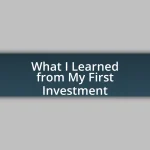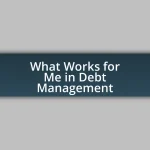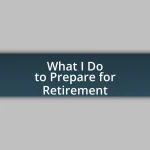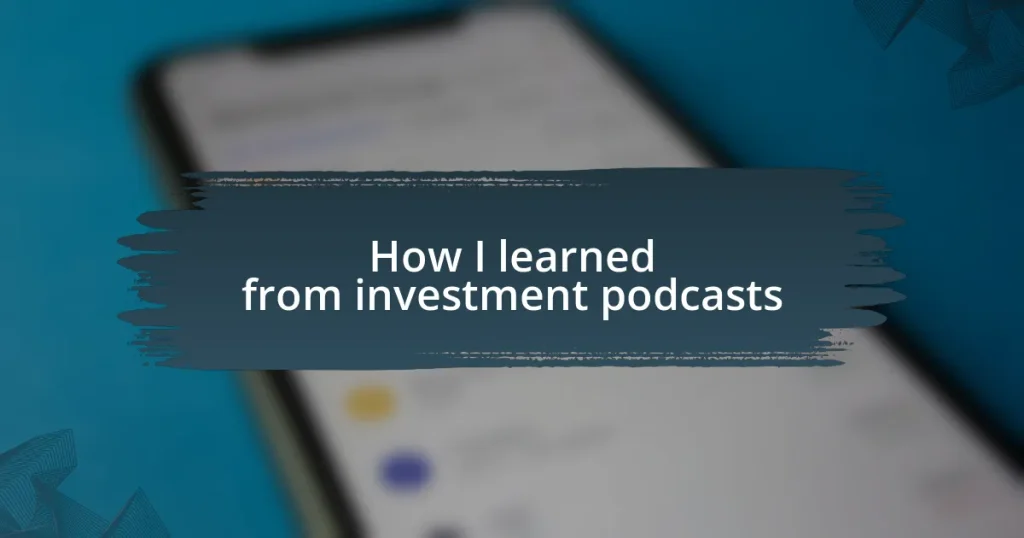Key takeaways:
- Investment podcasts simplify complex financial concepts through storytelling, making them relatable and engaging.
- Key lessons include the importance of consistency in investment strategies and understanding emotional intelligence’s impact on financial decisions.
- Implementing insights from podcasts, such as diversifying assets and setting specific goals, can enhance investment confidence and accountability.
- Consistent evaluation of a personal investment strategy and tracking performance metrics are vital for measuring success and adapting to market conditions.
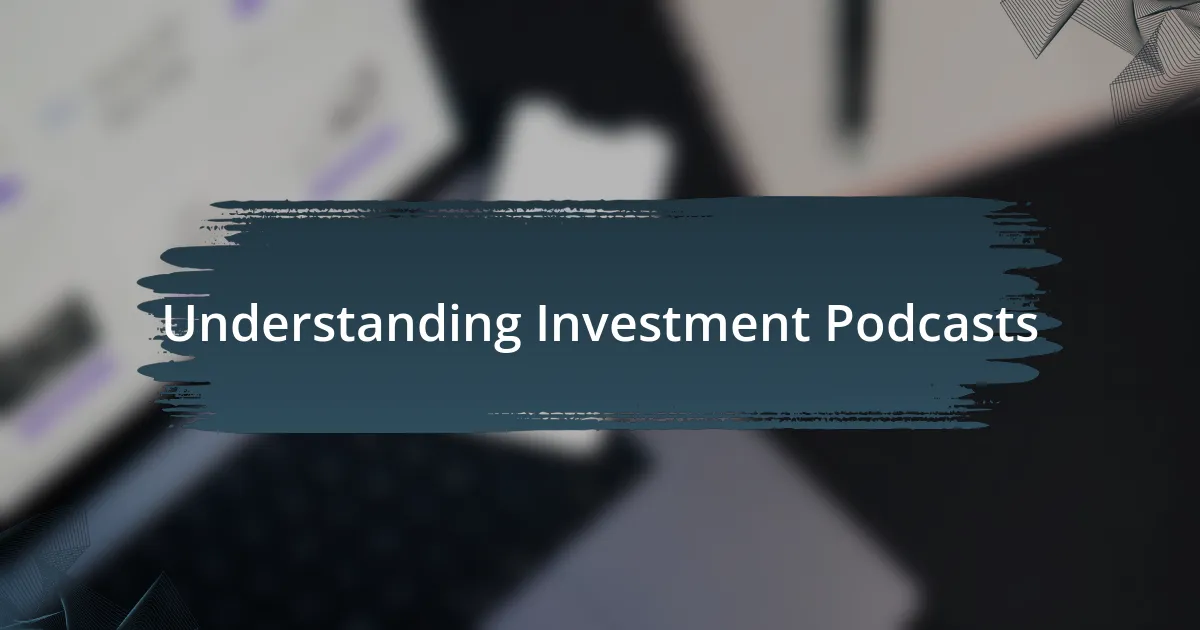
Understanding Investment Podcasts
Investment podcasts can seem overwhelming at first, especially with the wide range of expert opinions and jargon-filled discussions. I remember my first encounter with a podcast focused on stock analysis; I felt lost among terms like “bull markets” and “dividends.” Yet, over time, I learned to appreciate how these shows break down complex topics into digestible pieces, making financial concepts much more relatable.
Listening to investment podcasts is akin to having a mentor right in your living room. I find it fascinating how these hosts share real-life stories, sometimes revealing their own mistakes and triumphs. It’s as if they’re inviting the listener into their everyday lives, making me reflect: have I made similar choices in my investing journey? These narratives not only educate but also provide a sense of camaraderie among listeners—after all, we’re all on this financial path together.
A podcast often serves as a gateway into the world of investing for many. When I stumbled across a show discussing behavioral finance, I felt like the host was speaking directly to me, challenging my assumptions and biases. It opened my eyes to concepts I had never considered, urging me to dive deeper into my own motivations and fears surrounding money. The personal touch that interviewees and storytellers bring to their discussions creates an engaging atmosphere that keeps me coming back for more.
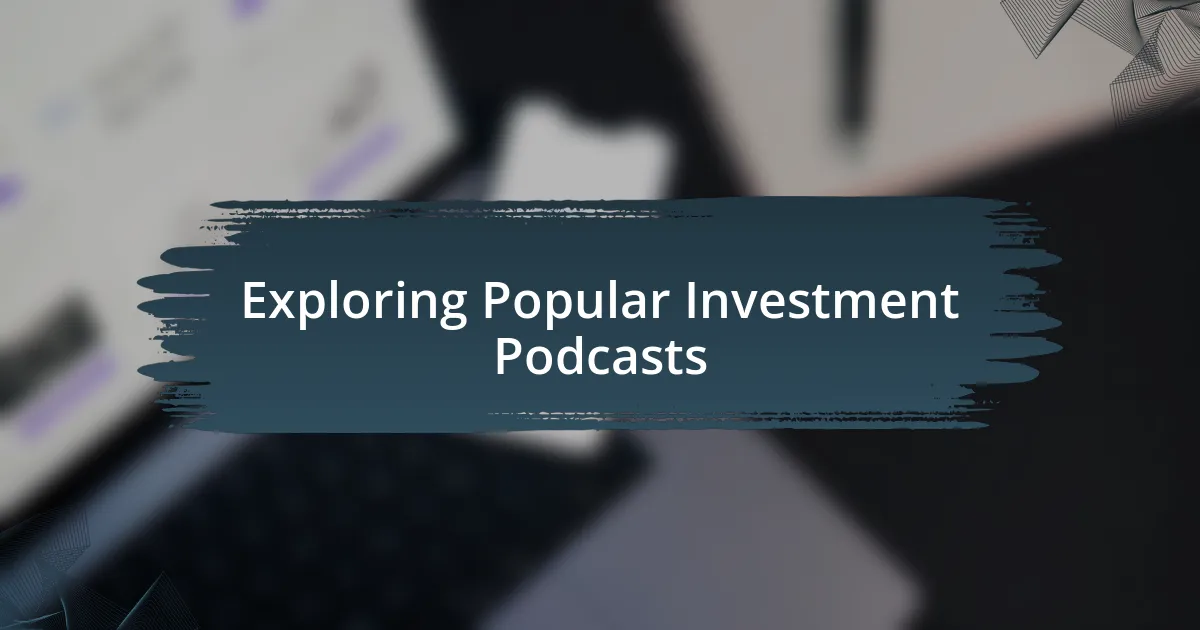
Exploring Popular Investment Podcasts
I remember the first time I explored the world of investment podcasts, feeling overwhelmed yet excited. I tuned into a popular show called “Invest Like the Best,” which features interviews with top investors. Each episode left me with so much to ponder, especially how the host seamlessly weaves expert insights with personal anecdotes. There was something refreshing about hearing seasoned investors share not just their strategies but also their setbacks. It sparked a realization that even the best in the field learn through trial and error.
Some popular investment podcasts that have truly shaped my understanding include:
- Planet Money: This NPR podcast breaks down complex economic topics into engaging stories.
- The Motley Fool Money Show: A great blend of investing advice and market news presented with humor.
- BiggerPockets Money Podcast: Focused on financial independence, it showcases real-life examples of financial success and challenges.
- The Tony Robbins Podcast: While not strictly investment-focused, it offers fantastic insights into wealth-building principles and mindset.
- The Rich Dad Show: Robert Kiyosaki’s discussions challenge conventional views on money, making me rethink my own beliefs.
Each of these shows has contributed to my evolving perspective on investing, reminding me that the learning process is ongoing.
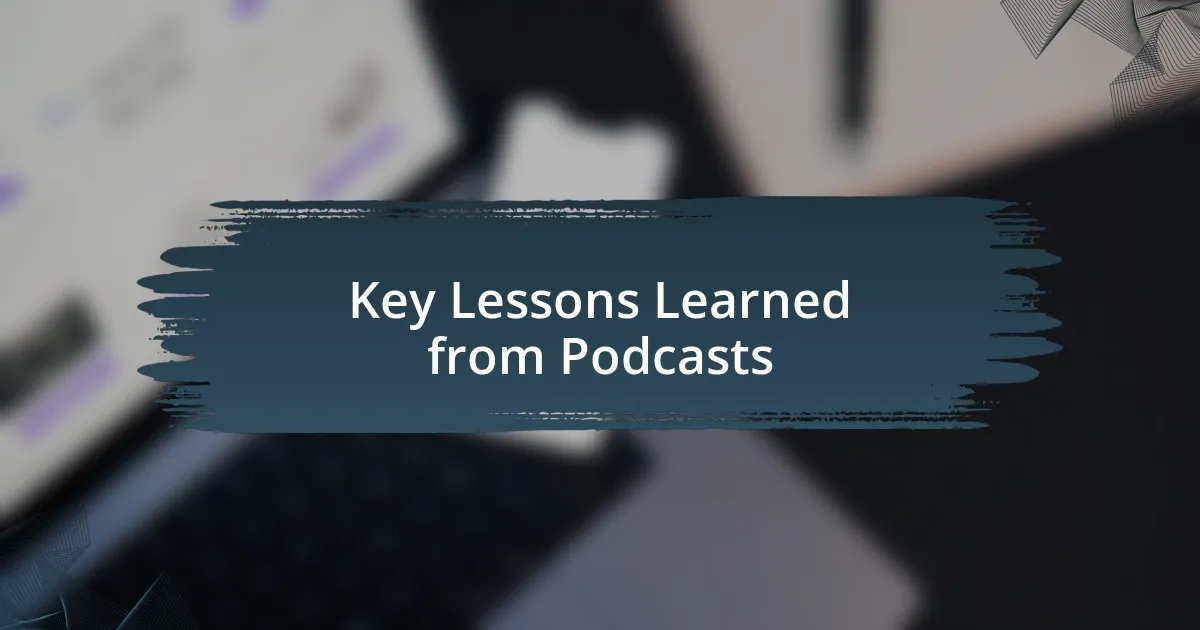
Key Lessons Learned from Podcasts
While listening to these podcasts, I discovered the impact of consistency in investment strategies. One episode of “Planet Money” featured a guest who discussed how sticking to a systematic investment approach, regardless of market fluctuations, led to significant long-term gains. That made me reflect on my own tendency to react impulsively to market news, prompting me to adopt a more disciplined investing mindset.
Another key lesson I learned was the importance of understanding different perspectives. On “The Motley Fool Money Show,” a discussion about the role of emotional intelligence in investing caught my attention. It resonated deeply with me, illustrating that cognitive biases can significantly affect our financial decisions. This realization helped me become more self-aware and a better investor, as I now strive to separate emotion from analysis when making investment choices.
One very memorable takeaway came from the “BiggerPockets Money Podcast,” where a guest shared their journey from financial struggle to success through strategic property investments. Hearing their story left me inspired and motivated. It reinforced my belief that investing isn’t just about numbers; it’s about life-changing decisions that require both courage and resilience. This understanding drives me to embrace a mindset of learning from every investment experience, whether triumphant or challenging.
| Key Lesson | Source Podcast |
|---|---|
| Consistency in Investment Strategies | Planet Money |
| The Role of Emotional Intelligence | The Motley Fool Money Show |
| Investing as a Life-Changing Journey | BiggerPockets Money Podcast |
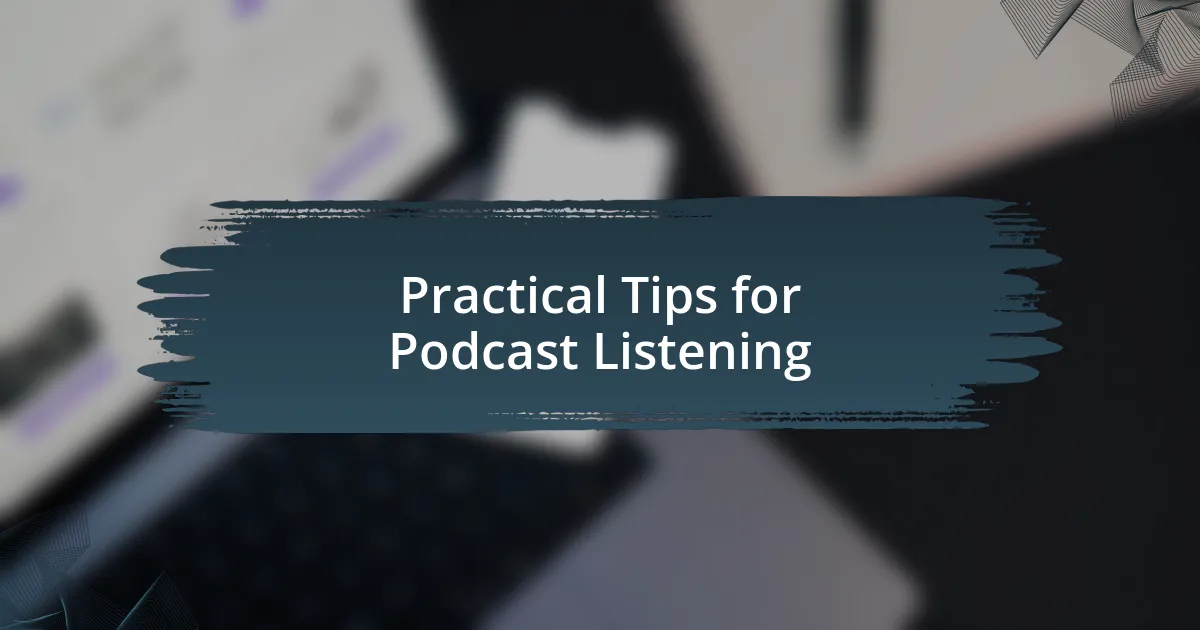
Practical Tips for Podcast Listening
When diving into investment podcasts, I’ve found that taking notes can significantly enhance the learning experience. I often jot down key insights and quotes that resonate with me, which not only reinforces the concepts but also allows me to actively engage with the material. Have you ever listened to an episode and felt overwhelmed by the information? Writing things down can prevent that feeling of confusion and help solidify your understanding.
Finding a quiet space to listen is another tip that really makes a difference for me. I’ve learned that distractions can easily derail one’s focus when absorbing complex investment concepts. Whether it’s a cozy corner at home or a serene park bench, creating a conducive environment allows me to fully immerse myself. This act of carving out time to listen also signals to me that investing in my knowledge is just as important as investing my money.
Lastly, I recommend revisiting older episodes that sparked my interest, as they often provide new insights upon a second listen. The depth of understanding can grow with time, much like the investment strategies discussed. Have you noticed how your perspective shifts over time? Reflecting on these changes can lead to a richer engagement with the content, making each listening session uniquely valuable.
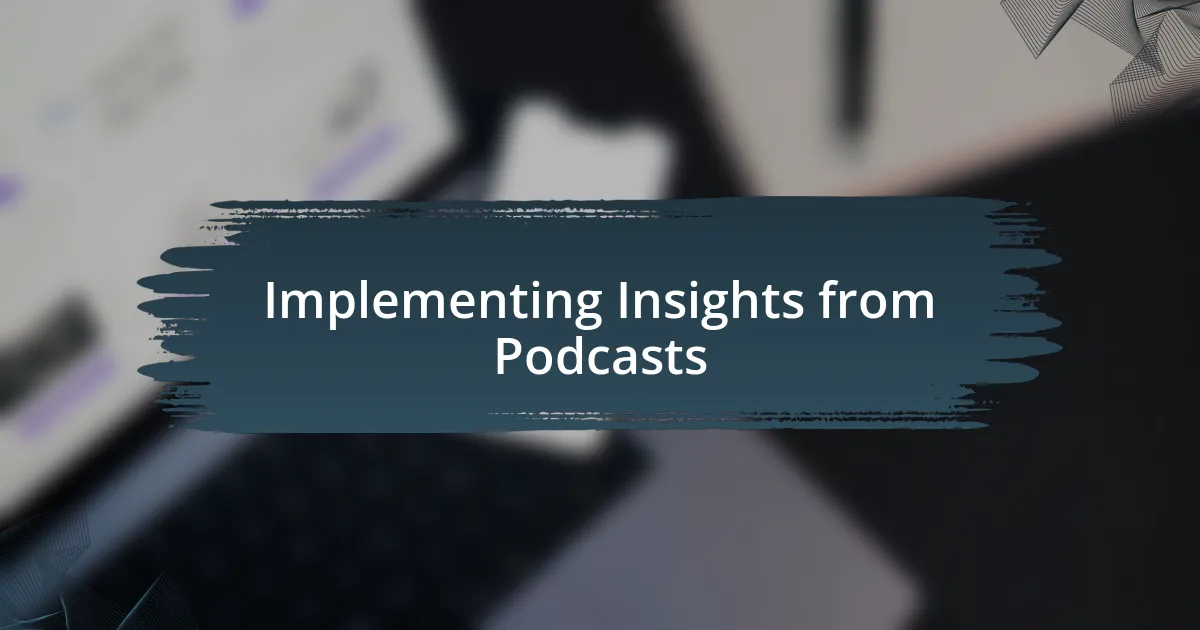
Implementing Insights from Podcasts
Implementing the insights I gain from investment podcasts has become a pivotal part of my learning journey. I often take a specific idea, like a unique investment strategy discussed in an episode, and apply it to my own portfolio. Recently, I began diversifying my assets after hearing a compelling discussion about risk management; that simple advice has already boosted my confidence in navigating market fluctuations.
Sometimes, I find myself reflecting on the advice given by industry experts during my daily routine. For example, a podcast prompted me to analyze my emotional response to investing—something I had previously overlooked. It felt enlightening to recognize how my fears could cloud my judgment, and acknowledging this has allowed me to make more rational decisions instead of acting on impulse.
One of the most impactful practices I’ve adopted is to set specific goals inspired by podcast insights. After listening to an episode focused on long-term investment strategies, I created a detailed plan outlining my targets. This doesn’t just motivate me; it holds me accountable. Have you ever felt a rush of excitement when starting a new venture? That’s how I feel, knowing that each actionable insight brings me closer to financial independence.
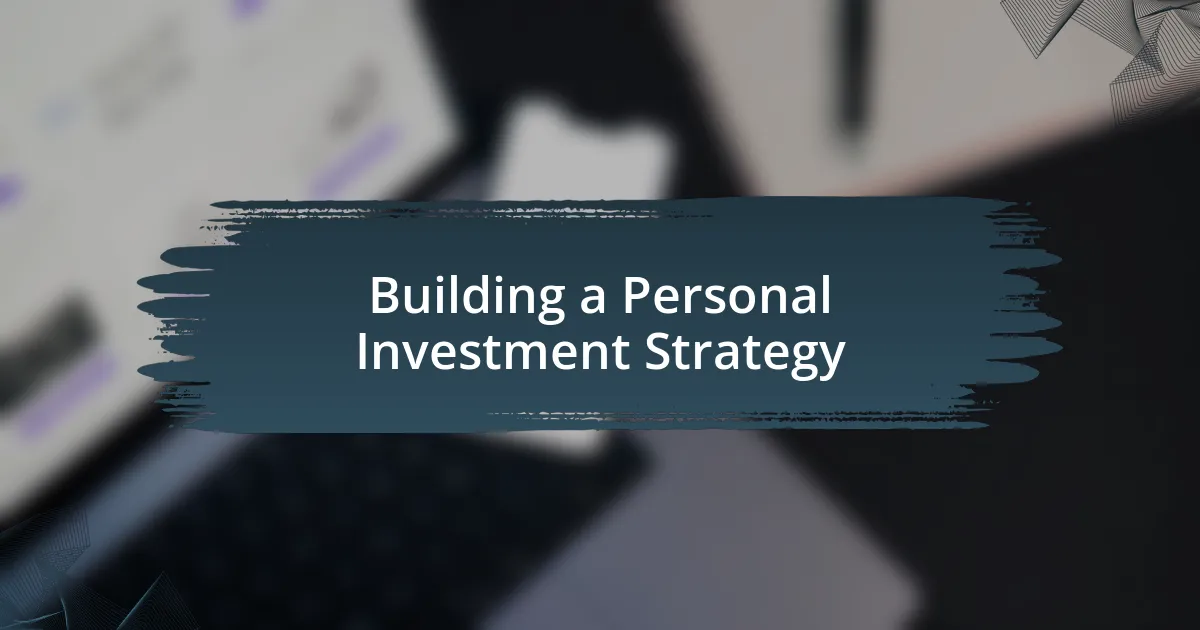
Building a Personal Investment Strategy
Building a Personal Investment Strategy
Crafting a personal investment strategy is like creating a roadmap for your financial journey. One strategy that has worked wonders for me is segmenting my investments based on risk tolerance. For instance, after listening to a podcast about risk assessment, I divided my portfolio into high, medium, and low-risk categories. This not only helps me balance potential rewards and risks but also ensures I’m mentally prepared for market swings.
I vividly recall a time when I faced a steep market decline; it was unsettling initially. However, having a solid strategy in place gave me a sense of control. I could stand firm knowing I had allocated my investments thoughtfully, which mitigated my anxiety. Isn’t it fascinating how a well-structured approach can empower us to stay calm when the financial waters get rough?
Moreover, consistent evaluation of my strategy is crucial. Inspired by a podcast discussion on adapting to changing market conditions, I started implementing a quarterly review process. This practice helps me stay aligned with my evolving financial goals and the unpredictable nature of the market. Have you ever felt the urge to change course midway through a journey? It’s similar, but with a clear plan, I find it easier to navigate all the twists and turns.
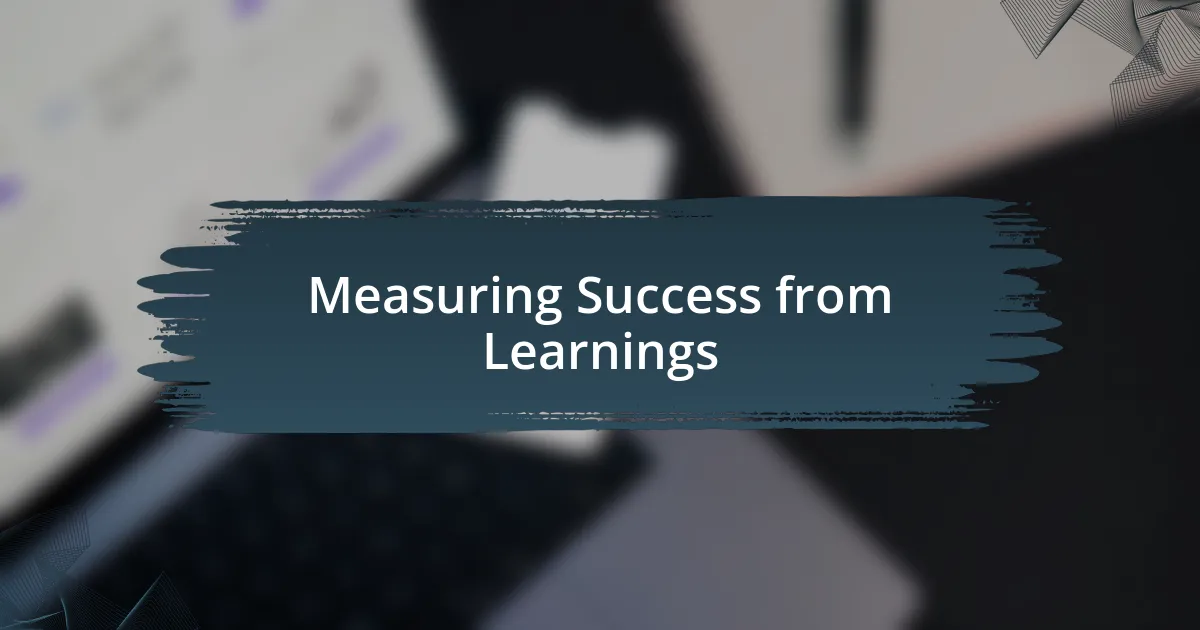
Measuring Success from Learnings
Success in learning from investment podcasts is not just about absorbing information; it’s about applying what you’ve learned and seeing tangible results. For me, tracking my investment decisions against performance metrics became essential. When I implemented a strategy based on insights from a podcast, I meticulously noted changes in my portfolio’s performance. Seeing growth or identifying setbacks became a powerful tool to refine my approach. Did I ever anticipate that simple tracking could provide such clarity?
Reflecting on my journey, I realized the importance of setting specific goals to measure my success. When I first began, I aimed for consistent monthly returns, but as I listened more, I understood that learning involves patience. It was a turning point when I adjusted my measure of success from immediate gains to learning outcomes, focusing on my understanding of market dynamics. Can you imagine the relief of shifting from a pressure-filled mindset to one centered on growth and knowledge?
The emotional aspect of measuring success is quite profound. There was a period when my investments did not perform as expected. Instead of feeling defeated, I revisited the lessons from podcasts that emphasized resilience and adaptability. I found strength in recognizing that every misstep was a stepping stone for future success. In a way, isn’t it incredible how our mindset can transform our experience of failure into a rich learning opportunity?





